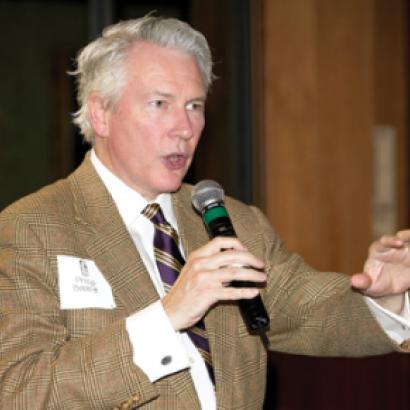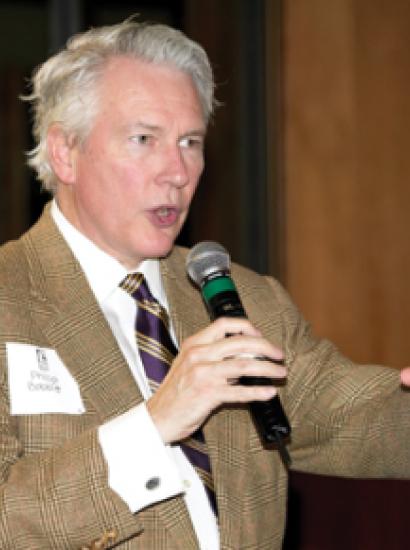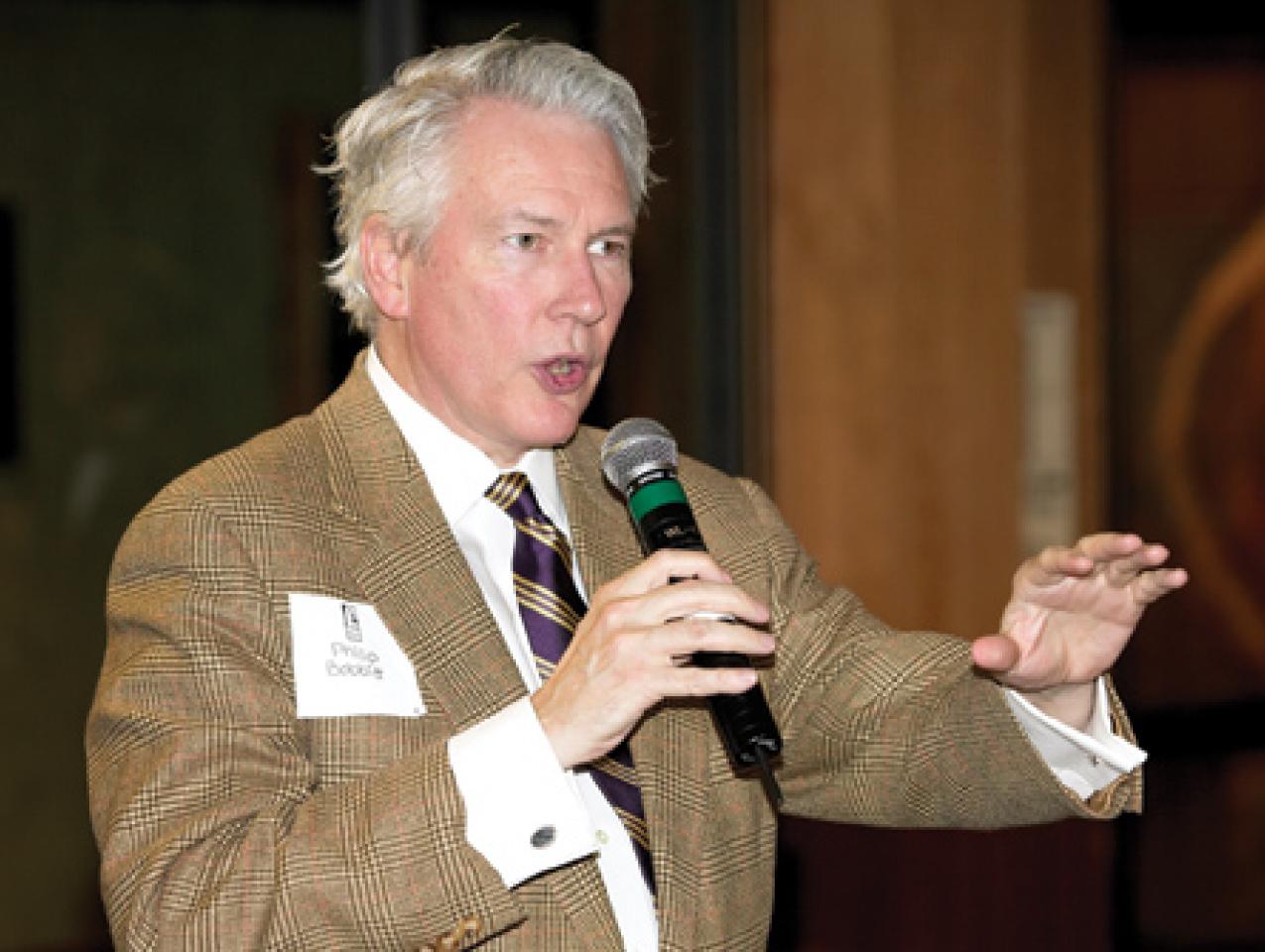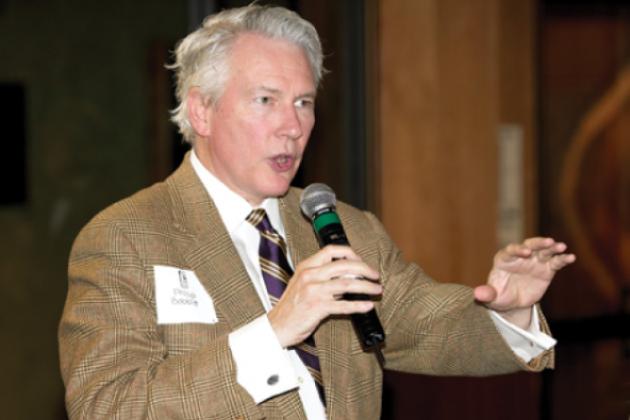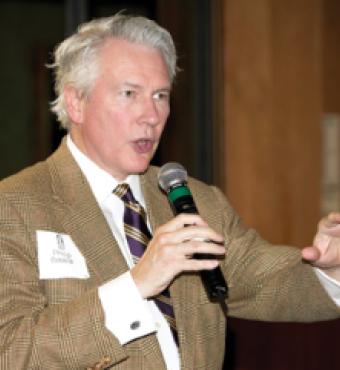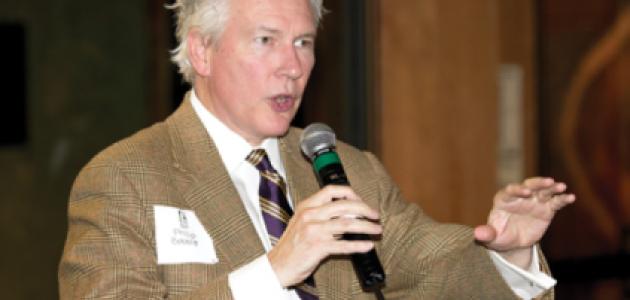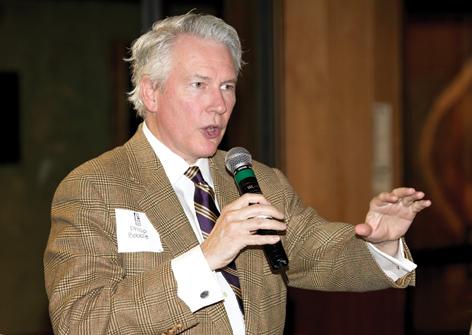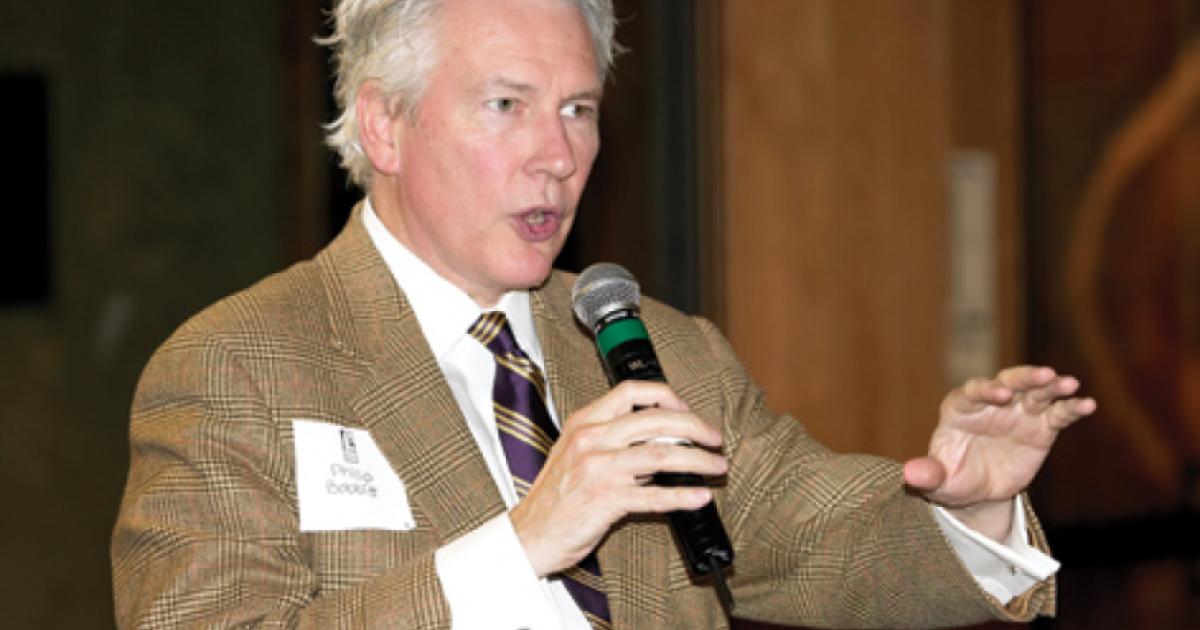- US Labor Market
- International Affairs
- US Foreign Policy
- US
- Contemporary
- World
- Law & Policy
- Security & Defense
- Terrorism
- US Defense
- The Presidency
- Congress
- Economics
- History
- Politics, Institutions, and Public Opinion
Philip Bobbitt, author of Terror and Consent and a member of Hoover’s Task Force on National Security and Law, spoke with Hoover Digest editor Peter Robinson in a recent broadcast of Uncommon Knowledge.
Peter Robinson: You write, “We must reform our ideas about terrorism, war, and the war aim if we are to win the wars of the twenty-first century . . . [preserving] states of consent and preventing the triumph of states of terror.” Some definitions here: what are the wars of the twenty-first century?
Philip Bobbitt: Wars potentially come in all shapes and sizes. What I had in mind were wars against terror. And I saw these as existing in three different dimensions: first, wars against twenty-first-century market-state terrorism; second, the use of a force—diplomacy and other measures, sanctions—to pre-empt the distribution and dissemination of weapons of mass destruction; and third, the use of force—aid, assistance—to prevent, and where not possible to prevent to mitigate, human catastrophes, like genocide or ethnic cleansing, or natural, such as earthquakes, or sometimes indeterminable, like epidemics.
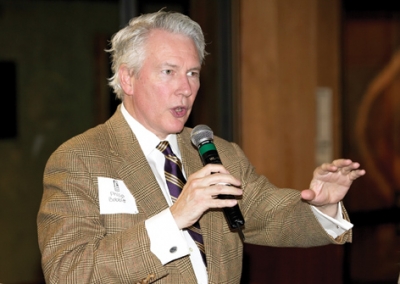
Each of these different phenomena can produce terror. They don’t produce an enemy that takes over your territory and seizes your state. But they threaten civilians, and if the state cannot protect civilians they jeopardize systems of consent.
Robinson: You mentioned that we are at war on terror. But by now it has become a commonplace to say terror is a technique of warfare, not an enemy. We are not at war on terror per se, we are at war with Islamic radicals. But you say no, we are fighting terror, not just terrorists. Explain.
Bobbitt: Most people whose views I respect think you can’t have a war against terror. It would be like a war against nostalgia or a war against any particular emotion. They also think that terrorism is a technique and therefore always just a means to an end. The key word I would withdraw from that proposition is always. It has typically in the past been a means to an end. But it can also be an end state itself, if what you want to do is make people too fearful to exercise choice, too terrified to exercise their own political, religious, moral, and social choices. Then what you want is a state of terror in both senses of the phrase. You want a state that maintains this terrifying atmosphere and you want to induce in the individual a constant fear, the presence of fear.
Robinson: So it is the pre-eminent duty of the modern state to protect the state of mind of its own citizens?
Bobbitt: That would be going a little far. I don’t know if we have to make the people jolly and upbeat and optimistic, but you have to protect civilians, and not just your civilians, from that terror that would keep them from doing what they have a right to do.
Robinson: You distinguish between the nation-state and the market-state. Can you explain those distinctions briefly?
Bobbitt: We want to look at terrorism in light of changes in the constitutional order. I am trying to remind the reader that we think we know terrorism because we know the IRA, the PKK, the FLN, the PLO . . . we know twentieth-century nation-state terrorism. We are not thinking about the sectarian mercenaries who sacked Rome in 1527 or who sacked Antwerp in 1576. We are not thinking about the pirates who razed Panama or the Barbary pirates who attacked territorial states or the North American savages who were hired by the French and Indians to massacre settlements.
Robinson: And who had no permanent designs on power within that state.
Bobbitt: We aren’t even thinking about the anarchists in the nineteenth century. We are just thinking about this particular epoch in which we live, that perhaps this is just a natural thing. But each kind, each form, of the constitutional order produces its own peculiar kind of terrorist. And the sort of state that we, the European Union, and the states in Asia are becoming is a state that outsources and privatizes its activities, that is global, that is networked. That kind of state will produce a terrorism that is global, networked, outsourced, and privatized.
Al-Qaeda will be studied because it was the first of the market-state terrorists. It outsourced its activities to old-fashioned terrorists, often groups that had been at each other’s throats for years. It paid them, it gave them logistic support, it sometimes gave them weapons. Its purposes were not to seize any particular national capital. Its purposes were global. The fact that it fed on jihadist religious sentiment admitted that it had a global base to begin with.
Robinson: In your view, then, Al-Qaeda represents a kind of prototype that can be studied, copied, and so forth—a kind of virus that can be reproduced for slightly different ideological ends. So you would reject out of hand the notion that what we’re engaged in is a war on radical Islam?
Bobbitt: I think you can have both. The Dutch Revolt in 1618 was an important political event in its own right in its history in the Low Countries. It was also part of the Thirty Years’ War. Now we do have a war against Al-Qaeda, but it’s also a part of a war against terror, so it’s not really one or the other. But what I’m writing about is the war against terror, of which the war against Al-Qaeda is just a part. If the jihadis suddenly became Presbyterians, our vulnerabilities and the kinds of threats we face would not materially change.
Robinson: Again quoting from Terror and Consent, “The states of consent must conform their strategic behavior to the rule of law, and the law to which they conform must be reformed to take into account changes in the strategic context.” The argument here is that the law matters a great deal. I can see your formulation as an aspiration, but the gears seem to me to slip when applied as a practical tenet.
Bobbitt: In the twentieth century we steadily separated law from strategy. We did that for, I think, very wise reasons. Despite the fact that we fought almost a century of war, we did not militarize the domestic environment. We had the Palmer raids, we had McCarthyism, we had slips along the way, but I think we have to rank that as a great success. Despite the struggles against fascism and communism, we did not resort to a police state at home in which a military, warlike environment pervaded the domestic theater. At the same time, as we fought overseas, although we persisted with the laws of war, we did not expect our strategies to be guided by law. There weren’t political commissars, and in every company or battalion people were not guided by legal rules. First we won the war, and then the law followed, as in Nuremberg or as in Japan.
In the twenty-first century I think we face the problem of reuniting these two. We want our strategy in the future to be guided by law because that is what we are fighting for. A war against terror is a war to protect civilians in doing what they have the right to do. It may be voting, or something as mundane as going to the supermarket or the marketplace or putting a child on a bus. What distinguishes the freedom fighter from the terrorist is that the terrorist is trying to use violence to prevent people from doing what they have a lawful right to do. The freedom fighter who assassinates Adolf Hitler is trying to prevent someone from doing something they have no lawful right to do. How do you conform law with the strategy?
The United Nations is a formidable and on the whole successful instrument of international policy. It is of a piece with the League of Nations. It springs from an American idea, which emerged from the First World War, that states could behave toward each other as individuals behaved in a rights-respecting democracy. It took the American Constitution and sort of blew it up with an executive, a judiciary, and a legislative body. The League failed at the end of the First World War, and the United Nations has had failures at the end of the Cold War. But on the whole, though, I think the U.N. has been a very successful institution. What it cannot do, however, is transcend the characteristics of its member states. They are nation-states, so they will obey national imperatives. That’s why you won’t get action in Darfur, that’s why you wouldn’t have gotten action in Cambodia, or in Kosovo, or Congo. Nation-states trying to advance the interest of their own nations will let global problems—climate changes might be one—slip because they are not prepared to make the sacrifices to address them.
Robinson: The way around this problem?
Bobbitt: I think we’ll develop new institutions, and I think we’ll invigorate old ones. I’ll give you two examples. One, NATO has lost its regional purpose, but it has a global purpose. And I can easily imagine what some people have called an alliance of democracies as its successor, meaning that instead of just the democratic states of Europe, you might have South Africa, India, Indonesia, Latin American states that are democracies. Two, you are not, however, going to have a global institution that leaves out Russia and China that’s successful. So for global problems that are not simply security problems you need something like the G-8, which has already taken up some of those responsibilities.
Robinson: Let me turn to domestic law. You’ve written, “With respect to domestic law, the United States must so construe the constitutional law that it protects human rights, and this will often mean strengthening the powers of government.”
Bobbitt: The problem here is the habitual way of looking at the relationships between rights and powers that so many of us share. I certainly have it, though I struggle against it. It’s an idea that there’s a spectrum along which exist the rights of the government and the rights of the people; that in times of emergency the needle of the spectrum tends toward the government and that its powers are greater and the rights of the people are less. In times of tranquility it might go back the other way: people having more power and the government having less. I think this is a deeply misleading paradigm.
The Declaration of Independence says the purpose of the government is to protect rights, full stop. That’s the only purpose stated in the Declaration of Independence. Our Constitution was instituted—a stronger government, a more powerful government than had hitherto existed, the Continental Congress and the Articles of Confederation—solely to protect our rights. You can weaken the government—you see this in Somalia, for example—and people’s rights are weakened also. Or you can strengthen a government, if you do it wisely, and people’s rights are also strengthened. It isn’t the case that, just because you have a national ID system, your rights have been lessened even though the government’s powers of information have been increased.
Robinson: All right then, we go into Afghanistan, we go into Iraq and pick up terrorists in the field, and, recognizing that we don’t have a legal regime that can cope with this problem, we stick them in Guantánamo. According to your view, the president should then have given a speech saying something like this: “We are in a new set of circumstances and the law by nature tends to be reactive, so I am hereby appointing a commission of distinguished jurists to attempt to draft laws that can deal with this extremely difficult situation that bears on the security of the nation—as regards both the detainment of many of these people who we have reason to believe are terrorists, and the security of the nation, to the extent that we must always preserve our self-respect as a nation of laws.” That would have been your solution to Guantánamo?
Bobbitt: I wish you had written that for the president to say. We need law desperately. When you move into a new situation, legitimacy is the first thing that begins to ebb away from government because our people don’t know what to expect, they don’t have the precedents on which to rely, to know what the government is planning to do. What we did was to take that away. We tried to operate in this environment without reforming the law.
Robinson: Give me your take on the conundrum of the ticking bomb. There’s a bomb ticking, hundreds of thousands of lives are at stake, we have reason to suppose the terrorist in this darkened room has knowledge about the whereabouts of that bomb. How, legally, would we address that problem?
Bobbitt: Well, I don’t know that the law should address that problem. I’ll tell you what I mean by that. The ticking-bomb problem is not for me, anyway, a difficult problem. If you have a terrorist and if he has information and if that information will lead you to defuse a bomb that would kill masses of innocent people, I don’t see any trouble with using whatever method you need to get the information. Not only would I torture him, I would torture you! If you told me right now, “I have information that will save 100,000 people in Palo Alto and I’m not going to tell you,” I’d do what I could to get it out of you. I don’t have any trouble with that. That doesn’t require changing the law—that can be unlawful and we can go before any jury in the country and if you really have any information you on good grounds believe to be just as we have said, which is a pretty high standard, it’s not just someone you suspect of having this—if you really have that, no jury in the country will convict you. The ticking bomb problem is a nonproblem.
Robinson: This is the old principle of hard cases make bad law. Is that what you’re asserting? Or are you asserting something else?
Bobbitt: In this case I would say hard cases make no law. It’s best not to try to make your law conform to such an extreme case.








